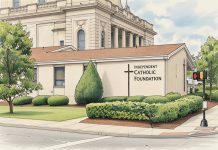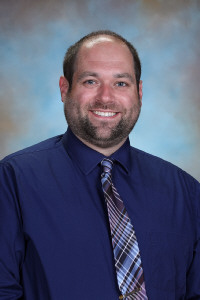Column by Jonathan Nagy
The end of August brings the end of the summer season and the beginning of a new school year in Pennsylvania. Students and teachers alike, now used to a different pace of life from the break, have to readjust to the coming year and the routine behind it. Books have been ordered, clothes purchased, and supplies gathered. Soon, the various lessons in each subject area will be taught, and students will be expected to retain information and grow.
Students enter schools with various struggles, some they can control and some they cannot. In a full classroom, each student brings with them challenges to learning. Teachers do amazing jobs working to reach each child in front of them. Parents, students, and teachers look for guidance on how to handle each situation. Apple used to use the slogan, “There’s an app for that!” When looking at the struggles of students, for each one, I prefer to say, “There’s a saint for that!” Here are five saints and the educational lessons to be learned from each one.
Saint Thomas Aquinas
Saint Thomas Aquinas struggled throughout his education. His peers called him “The Dumb Ox” because he was slow in speech and struggled with obesity. Most modern prayer cards and pictures of Thomas show him as a slender, authoritative man. However, taking away the glossiness, we see he was anything but the perfect image given to us today. Thomas worked twice as hard in school as his classmates, and never let their insults adversely affect his studies. They misunderstood his quiet and humble approach and slowness to answer as an educational defect. Also, some stories relate that Thomas had such a large belly that the table had to be cut so that he could sit to eat and eat he did. However, Thomas Aquinas overcame all of these difficulties to become a Doctor of the Church through his extensive and prolific writings. In fact, one of his teachers, Saint Albert the Great, once said of Thomas, “We call this man a dumb ox, but his bellowing in doctrine will one day resound throughout the world.”
St. Thomas Aquinas, when you were young, your classmates called you a “dumb ox”. Instead of arguing with them or fighting back you endured their insults humbly. Pray that students today may also be humble, like you, when people try to tear them down or insult them.
Saint Therese of Lisieux
A modern saint and another Doctor of the Church, Therese, born Marie Francoise-Therese Martin, was an excellent student at a young age, taught by Benedictine nuns at the Abbey of Notre Dame du Pre in Lisieux, France. She was at the top of her class at the age of eight but found herself constantly bullied by girls much older than her, due to their jealousy. The girl who bullied her the most was a fourteen-year-old who struggled in school. A very sensitive child, Therese suffered much and cried in silence. She wrote, “The five years I spent in school were the saddest of my life.” She came to despise school for these reasons, and often hid from others to avoid being bullied. She often said that if not for her sister Celine, she would not have made it through school. It was during this young age, especially after her sister Pauline entered the Carmelite cloister in Lisieux, that Therese began feeling a calling to a life of prayer and work.
Dearest St. Therese, you who once knew the cruelty of bullying, come to the aid of all students who are enduring any kind of bullying – physically or emotionally – in our world today. Pray for them that God will give them the grace to know how undeserving they are of this treatment, and how beautiful they will always be in the eyes of their Creator.
Saint Ignatius of Loyola
Now considered one of the great intellectuals of the Catholic Church, that claim could not always be applied to Ignatius. Later the founder of the Jesuit order, an order dedicated to education, Saint Ignatius is often seen as a patron saint for students who struggle with their studies. Possessing lax morals, Ignatius experienced a privileged lifestyle as a child as his father was a wealthy military hero. At a young age, Ignatius joined the Spanish army. At 13, his left leg was seriously wounded in battle by a cannonball. Unable to leave his hospital bed for quite a long time, and looking for a distraction from the pain, he asked his nurse to bring him a book to read. She brought him two books – The Life of Our Savior and Lives of the Saints. These books had a profound impact on Ignatius, and he abandoned his military career and sought one in Catholic education. He lacked the educational requirements and money to enter school as his parents refused to support his choices. He begged for money for years before finally having enough to be admitted to a Catholic university at the age of 30. After struggling through many academic, physical, spiritual, and emotional difficulties, Ignatius was eventually ordained to the priesthood. The Jesuits, or Society of Jesus, lived in poverty while carrying out their goal to educate. Ignatius’ perseverance and dedication to his cause have let to the founding of hundreds of Jesuit schools all around the world.
Saint Ignatius, you understood the struggles of students in education. Assist students who find themselves in equally difficult struggles. Ease their minds and intercede to help provide the funds for all who seek a Catholic education to obtain one.
Saint Augustine
By all accounts, during his adolescent and young adult years, Augustine of Hippo could be described as a “holy terror.” Born the son of Monica, a devout Christian, and Patricius, a pagan, Augustine was educated in the best secular schools of the day. He led an intentional non-Christian, immoral life. He lived with a young woman without marriage and fathered a child with her. Accounts relate that he was also an alcoholic. Despite the terrible path that Augustine was forging for himself in life, his mother never gave up on him. It is stated that she prayed seventeen years for his conversion. Something inside of Augustine knew that he was leading the wrong type of life. He once wrote, “Lord, give me chastity and continence, but not yet!” The older he became, he found himself searching with what he called a “restless heart” for meaning in life. The sinful pleasures of the world did not fulfill him. He found that only in God could he be fulfilled. In his book Confessions, Augustine wrote, “You have made us for yourself, Lord, and our hearts are restless until they rest in you.” Not long after his conversion, he was baptized, was ordained a priest, and later a Bishop. This man, who gave in to pleasure, found his peace with Jesus Christ.
O great Saint Augustine, be an example to all young people who are on the wrong path of life. Show them that it is never too late to turn to God, nor will He reject them. Let your mother, Monica, be an inspiration to all parents to never give up hope for their children, and constantly seek out the intercession of Jesus Christ in their lives.
Saint Joseph of Cupertino
Described by many as “dull, slow-learning, absent-minded, awkward, and clumsy,” Joseph struggled with adversity, especially in his young years. His own mother found him to be a constant nuisance since he was unable to work and was
uneducated and unintelligent. He applied to the Franciscan monastery in Cupertino, Italy, but they would not accept him due to his lack of education. His mother, knowing he would fail, still pulled some strings to get him accepted to the monastery, and failed he did. After years of wandering as a beggar, he returned to the monastery and offered to work as a servant in the stables. Being given such lowly tasks humbled Joseph, which in turn conversely made him happy. He did dirty work and never complained. He laughed when things went wrong, or he made mistakes. The friars began to take more notice of Joseph and how he was respected, especially by the poor. While his oddities and clumsiness bothered many friars, others were drawn to him and led to the discussion of whether or not he should be considered for the priesthood. His struggles as a student persisted, but he was eventually ordained a priest and many locals were drawn to him, especially as he began to receive the “Gift of Visions.” Because of this extraordinary gift, he was hidden away from the public for the last 35 years of his life as he became a distraction. Anyone who knew young Joseph would never have imagined how great of an impact he would have on the faith of so many.
Saint Joseph of Cupertino, who was doubted by many, including family and friends, be an inspiration to students who struggle. Show them how their mistakes help them grow and that there is always a chance for redemption. Guide them to do great things in the Name of Jesus!
May the stories of each of these great saints inspire our children as they return to the classroom. May they see that no matter their struggles, God is always there, and that they are destined to do great things. Through the intercession of Saints Thomas Aquinas, Therese, Ignatius, Augustine, and Joseph of Cupertino, may their school year be one of growth, rooted in the faith. May God bless each and every student in their studies, inspire their teachers in their lessons, and guide families to be a strong support system for each other.
Have a great school year!
Jonathan Nagy, M.Ed., is the Dean of Students and Social Studies teacher at Bishop Carroll Catholic High School in Ebensburg. He is also the Music Director at the Basilica of Saint Michael the Archangel in Loretto.































